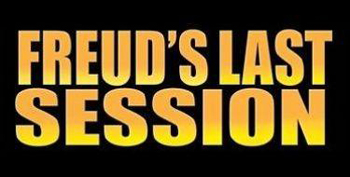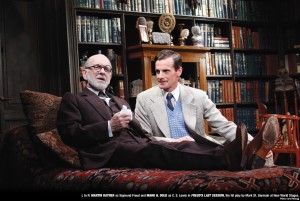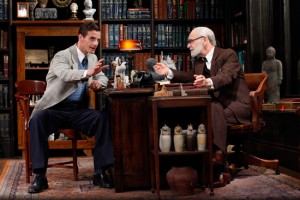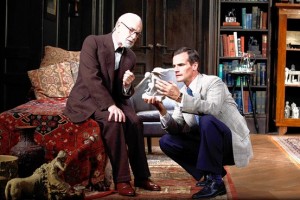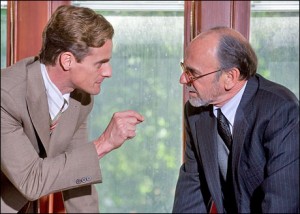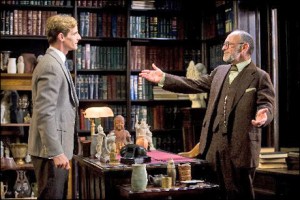A FREUDIAN TRIP
Freud’s Last Session at the Mercury Theater is a “what if” play. What if the Austrian psychoanalyst Sigmund Freud and the English professor and author C. S. Lewis met in Freud’s study in London for a morning of conversation? What if that meeting took place in 1939 on the day World War II started, two weeks before Freud’s death? At the time Freud was a world famous and controversial figure; Lewis was a little known Oxford University don (AKA a fellow or a tutor) with the books that would make him famous ahead of him: The Screwtape Letters and The Chronicles of Narnia.
In this fictional account, Lewis visits Freud at the great doctor’s invitation. It doesn’t take long for the two men to lock intellectual horns. Freud is a committed atheist and Lewis is a passionate Christian. The gulf between them is unbridgeable, but the theological loggerheads inspire some great talk, each man firing his guns with passion and conviction. The conversation also veers off into stimulating – and just as passionate – exchanges on war, suicide, suffering, and sex. The exchanges grow heated, but the verbal combatants never lose their manners. The play reminds the audience how highly charged and emotional issues can be approached by opposing sides without descending into shrill insults and personal attacks. What are the chances such a debate would be conducted today with such civility? Based on the screeching political discourses that bombard us today, the chances are considerably less than zero.
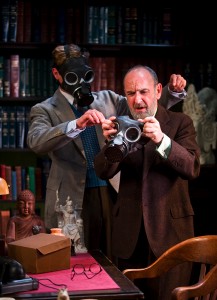 Naturally, neither side convinces the other of his point of view, but both give as good as they get. The men frequently inject humorous banter into their debate, preventing the play from turning into an academic exercise. Playwright Mark St. Germain has humanized both characters, giving the audience three-dimensional individuals instead of stiff position papers on the existence or nonexistence of God.
Naturally, neither side convinces the other of his point of view, but both give as good as they get. The men frequently inject humorous banter into their debate, preventing the play from turning into an academic exercise. Playwright Mark St. Germain has humanized both characters, giving the audience three-dimensional individuals instead of stiff position papers on the existence or nonexistence of God.
The flow of intellectual discourse is interrupted from time to time by the outside world. The men listen to BBC radio news reports of the approaching war between Britain and Germany and there is even a sudden air raid alert that sends both men scurrying for their gas masks. The prospect of a new war returns Lewis emotionally to the horrors of WW I trenches that inflicted psychological scars he still carries. And Freud endured ugly tastes of the cruelties the Jews endured from the Nazis before he managed to leave Austria for the safe haven of England.
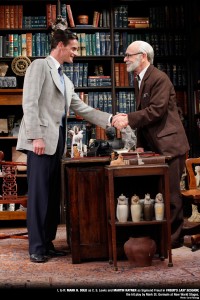 Most of all, there looms the specter of Freud’s losing battle with oral cancer, its agonies making the man’s waking hours a hell of suffering that would lead to his ordering his doctor to give him a fatal injection of morphine to put him out of his misery.
Most of all, there looms the specter of Freud’s losing battle with oral cancer, its agonies making the man’s waking hours a hell of suffering that would lead to his ordering his doctor to give him a fatal injection of morphine to put him out of his misery.
Freud’s Last Session runs about 80 minutes with no intermission, just the right amount of time to allow the characters to explore their weighty philosophical and religious issues and play out the human dimension in their encounter. If their meeting solves nothing, it does allow the audience to absorb lots of challenging and articulate talk about issues that touch the core of human existence. The playwright is even-handed in allowing each man his say, but Freud comes off as the more dominant figure, partly because the cynic is generally more entertaining than the true believer, partly because Freud is such an endearing curmudgeon, and partly because we sense the man is dying before our eyes. Lewis has something of the stiff-upper-lip Englishman in him, plus his respect verging on awe for Freud, in spite of the doctor’s atheism, concedes Freud much of the center stage.
Freud’s Last Session is in its second year off Broadway in New York City and the producers are hoping for an extended run at the Mercury Theater, an ideal intimate venue for the show. They have imported the original New York cast of Martin Rayner (Freud) and Mark H. Dold (Lewis). (As of June 3, 2012, Mike Nussbaum and Coburn Goss will take over the roles.) Both actors nail their characters. Rayner has the spotlight role and capitalizes on it theatrically and dramatically. Dold is his equal, achieving a warmth that complements his zeal and spares Lewis from coming across as a religious zealot and a bit of a prig.
Tyler Marchant’s directing is properly unobtrusive, giving the performance a feeling of realism and inevitability and allowing his two superb actors to do their thing without noticeable directorial intrusion. Production credits are first rate, led by set designer Brian Prather’s book-lined study. Mark Mariani designed the costumes, Clifton Taylor the lighting, and Beth Lake the sound.
Freud’s Last Session is one of those rare events in today’s theater, an adult play in the best sense of that much-abused word. It’s absorbing, often eloquent, and best of all, accessible, no matter what the viewers’ religious convictions and how wary they are of highbrow plays. The play may not effect any conversions to either theological view but it will entertain, and perhaps stir some patrons to vigorous chat over drinks after the leaving the Mercury.
photos by Carol Rosegg
Freud’s Last Session
Mercury Theater in Chicago
ends on June 3, 2012EXTENDED to November 11, 2012 with Mike Nussbaum (see review here)
for tickets, call 773-325-1700 or visit Mercury Theater
for more shows, visit Theatre in Chicago
